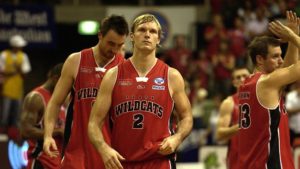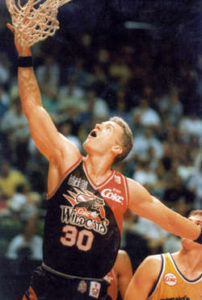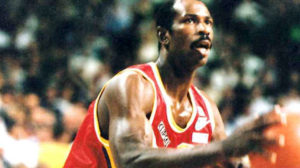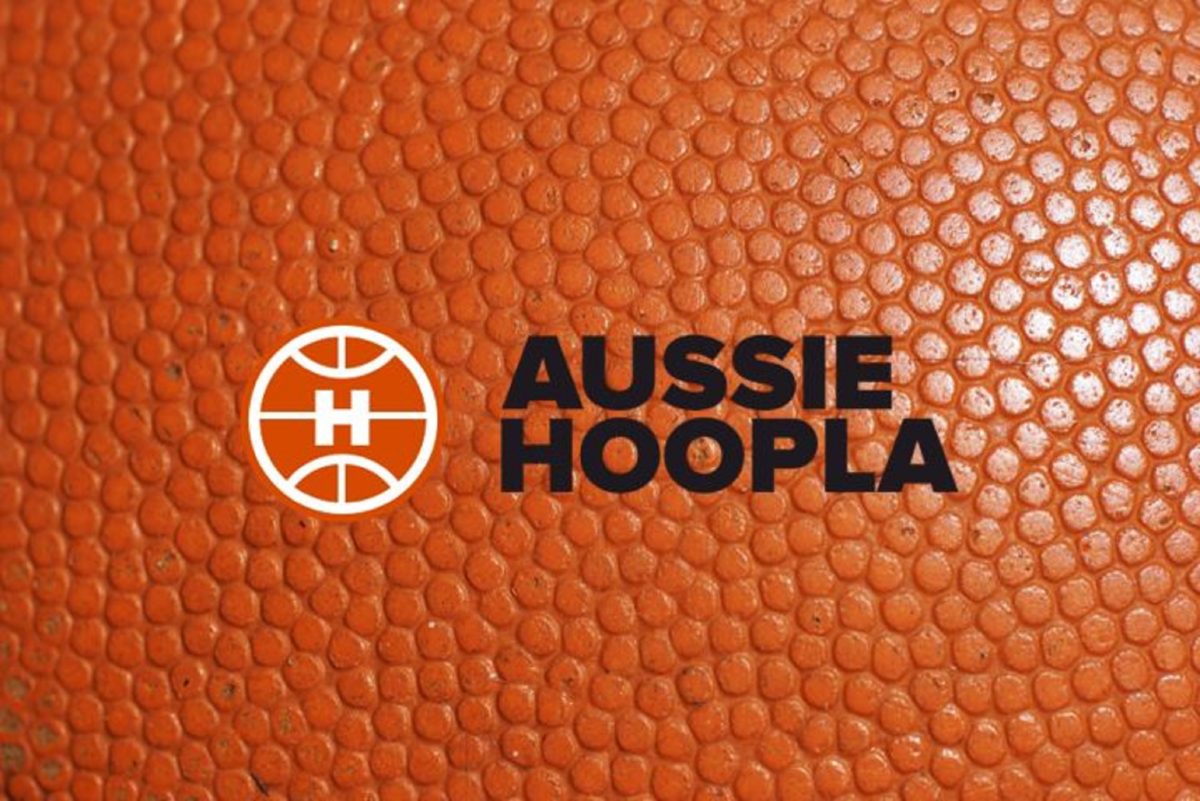
To create all-time #NBLrank, the Aussie Hoopla writing team have all voted on the greatest players to play at each position as well as a few select other criteria.
Each Aussie Hoopla writer has made their decisions, but now we want to hear from YOU!
- Our top five point guards in NBL history.
- Our top five shooting guards in NBL history.
- Our top five small forwards in NBL history.
- Our top five power forwards in NBL history.
- Our top five “one and done” players in NBL history.
To create all-time #NBLrank, the Aussie Hoopla writing team have all voted on the greatest players to play at each position as well as a few select other criteria.
We will be unveiling the results of each position week by week but be sure to vote for whom you think should be #1 at each position below or tweet us your thoughts by using hashtag #NBLrank.
5. TONY RONALDSON
Listen to our podcast with Tony Ronaldson
- Eastside Spectres 1990-1991
- South East Melbourne Magic 1992-1998
- Victoria Titans 1998-2002
- Perth Wildcats 2002-2007
- New Zealand Breakers 2007-2010
When it comes to the game of professional basketball, winning is what most will say is the overall goal. Tony Ronaldson was one of that rare breed to show that game in and game out on the court. In 665 NBL games, the most games anyone has ever played in the NBL, Ronaldson won in 430 of those contests. Another feat only Ronaldson can say he has done.
Entering the league as a teenager with the Eastside Spectres, Ronaldson’s debut in 1990 showed a kid with plenty of potential but also included a number of “almost” moments.
The Eastside Spectres finished second in the league, Ronaldson’s contributions almost earned him the league’s Rookie of the Year award (he finished second in voting, coaches selecting Hobart’s Jason Cass instead) and his Spectres almost reached the Grand Final (losing in the semi-final’s to Brisbane).
This season seemed to shape the remainder of Tony’s career, a career where he played to win every time, so perhaps he never had to feel the pain of “almost” again.
When the Spectres merged with the Southern Melbourne Saints the next season, Ronaldson was one of the founding members of the classic Victorian club, the South East Melbourne Magic. During that season his production and role grew considerably, eventually becoming one of the team’s captains.
He played with the Magic for eight years, winning two titles in 1992 and 1996 and established himself as a premier power forward in our league, something the national team took notice of as he earned Boomers selection in 1994.
In four of his last five seasons at the Magic, Ronaldson was top ten in three point makes. He was somewhat of a trailblazer at the power forward, the league’s first “stretch-four” you could say, something the NBA hadn’t recognised until the late 2000’s.
Ronaldson’s unique skill set gave the team’s he played for a unique advantage where he could drag opposition forwards out to the three point line and provide space for his teammates inside.
The Magic merged with the North Melbourne Giants in 1999 and formed the Victoria Titans which provided Tony an opportunity to establish himself as a team leader. Success continued to follow, Ronaldson team’s making the grand final in their first two years but ultimately falling short both times.
He moved across the country to Perth in 2003, separating from long-time coach Brian Goorjian, but success followed him across to Western Australia. The Wildcats had suffered on many occasion from Ronaldson baskets, and they respected his achievements by making him captain of the club in 2005. The Wildcats appeared in the playoffs every year he played there.
His career finished across the Tasman in New Zealand, leaving the Wildcats in 2007 and retiring with the Breakers in 2010 as the winningest player in NBL history. Although the Breakers never won a title during Ronaldson’s time there, his experience and work ethic were something he shared with his New Zealand teammates during his stay, and this was vital to the team capturing its first NBL title in 2011.
He contributed to five teams and won everywhere he went. He also brought to attention that big men can move out from out of the key and stretch defences all the way to the three-point line. If only he played a decade later, he might have been higher on this list.
Career Statistics (per game averages in brackets)
Points – 10,154 (15.3)
Assists – 1,809 (2.7)
Rebounds – 3,463 (5.2)
Steals – 373 (0.6)
Blocks – 179 (0.3)
Shooting Percentages – 42% FG, 35% 3PT, 70% FT
Awards:
- 2x NBL champion (1992, 1996)
- 1x All-NBL Third Team (2002)
- 1st All-Time in Games Played
- 1st All-Time in Wins
- 5th All-Time in Points
- 7th All Time in 3PT Makes
- 11th All-Time in Rebounds
- 2x Olympian (1996, 2004)
4. MATTHEW NIELSEN
- Sydney Kings 1995, 1997-2004
When the Sydney Supersonics and the West Sydney Westars merged to create the Sydney Kings in 1988 Matt Nielsen was 10 years old. Nielsen watched the team grow into an exciting new phenomenon in the early 1990’s and he had dreams of wearing the Kings colours while attending nearby St Marys Senior High School.
Nielsen’s talented was recognised by the Kings before he had even completed school, Neilsen even began training with the Kings while still a school boy and had to ask permision to leave school early on certain days to be a part of the team’s training.
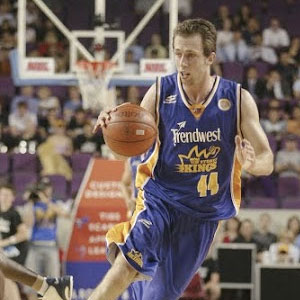
Nielsen spent one year developing his game at the Australian Institute of Sport before returning to the Kings with a renewed drive and purpose.
This showed in 1997, his Rookie of the Year season where he averaged ten points and five rebounds per game.
Although Nielsen had achieved a level of success the Kings certainly had not. In 1997 they finished with a 12-18 record, however slowly and surely as Nielsen’s role and production improved, so did the Kings in the wins column.
By 1999 Nielsen had established himself as a franchise level player and was averaging 20 points and nine rebounds per game. Sydney had improved to a level where playoffs were in the picture and Nielsen was rewarded with an All-NBL Second Team award in 2001.
Sydney was able to combine Nielsen with legendary Boomers player Shane Heal to give the Kings a “one-two punch” and shortly after added two high-level imports in Chris Williams and Kavossy Franklin. With this talented four-man unit and new coach Brian Goorjian at the helm, Sydney had a dynasty.
Nielsen, Heal, Franklin, Williams and Goorjian delivered the city of Sydney it’s first ever NBL championship in 2002-03. It took the Sydney Kings 14 years to build a championship roster but only six months for circumstances to dismantle it.
Shane Heal’s form was rewarded with a second chance at an NBA career, imports Williams and Franklin leveraged off their NBL seasons to score lucrative European gigs which left only Nielsen remaining from the team’s championship starting five.
Nielsen was named captain for the next season and Goorjian would replace the exiting talent with a strong core of Australia talent (CJ Bruton, Jason Smith and Brett Wheeler) and two exciting new imports in Ebi Ere and Chris Carrawell. Nielsen flourished in his new role as franchise player and played his best basketball yet.
Nieslen averaged 22 points, 11 rebounds and 2.5 blocks, all top three in the league that year. There was no arguing he was the league’s MVP, an award he collected along with a second championship, a Grand Final MVP award and Olympic selection.
After winning two titles and an MVP award, he then moved to Europe to play basketball with powerhouses in Greece, Lithuania, Spain and Russia. However, he will always have been known as that young Sydney kid who brought respect and legitimacy to the country’s biggest city. He was honoured with a starting position on the Sydney Kings’ 25th Anniversary Team in 2013.
A passionate leader, a fiery competitor and a complete basketball player, Matt Nielsen was everything to a team and city that needed someone to bring glory to their shores. He did a fantastic job and is worthy of this list.
Career Statistics (per game averages in brackets)
Points – 4,259 (17.5)
Assists – 624 (2.6)
Rebounds – 1,964 (8.0)
Steals – 247 (1.0)
Blocks – 357 (1.5)
Shooting Percentages – 53% FG, 29% 3P, 69% FT
Awards:
- 2x NBL champion (2003, 2004)
- 1x NBL MVP (2004)
- 1x NBL Grand Final MVP (2004)
- 1x Gaze Medal winner (2003)
- 1x NBL Rookie of the Year (1997)
- 1 All-NBL First Team (2004)
- 2x All-NBL Second Team (2001, 2003)
- 3x Olympian (2004, 2008, 2012)
- Member of Sydney Kings’ 25th Anniversary Team
3. CHRIS WILLIAMS
- Sydney Kings 2002-03
Who was a better player in their one season in our league? Chris Williams or James Ennis, it’s a tough call, but when discussing what Chris Williams achieved while he was here is unmatched.
His one season down under was easily the best statistical season for a championship winning player.
Few imports in our league have been so good, so fast and even after a stellar career at the University of Virginia (where he was named to three All-ACC conference teams), no-one could have expected Williams to contribute like he did.
In his first NBL game he finished with 24 points, 16 rebounds, three steals and two blocks, notifying opposition teams that 22-year-old could play with the best of them.
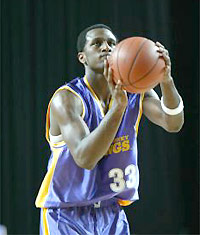
The 199cm forward played a lot bigger than he was, defending small forwards, power forwards and centres. His versatility was also evident on offence with him leading the league in scoring, finishing second in rebounds and steals and being in the top five for blocks.
In a game against Melbourne, he was only one steal and one block away from a fabled five by five, recording at least a five in each of the five statistical categories.
A Sydney Kings squad that included Williams, Matt Nielsen, Shane Heal and Kavossy Franklin was bound to encounter success as they won the minor premiership above the Perth Wildcats.
They had some trouble in the first two rounds of the playoffs, going the full three games against Melbourne and Townsville but hit their stride against the Wildcats in the Grand Final series, led by Williams.
He averaged 25 points, 10.5 rebounds, 4.5 assists, 2.5 steals and 1.5 blocks on his way to the Grand Final MVP award and Sydney’s first ever championship.
His season was also capped by the league’s MVP award and an All-NBL First Team selection. Apart from the Defensive Player of the Year award, Williams did all he could in one season.
His legacy was so great that in 2013 the Kings named him to their 25th Anniversary Team, the only player to compete in a single season.
As complete as anyone who has played in the league, it’s a shame for NBL fans that he moved on to greener pastures. With the streaming service NBL.tv providing classic games it’s well worth going back and watching how great he was in this league.
Career Statistics (per game averages in brackets)
Points – 896 (23.6)
Assists – 165 (4.3)
Rebounds – 460 (12.1)
Steals – 82 (2.2)
Blocks – 49 (1.3)
Shooting Percentages – 53% FG, 16% 3PT, 63% FT
Awards:
- 1x NBL champion (2003)
- 1x NBL MVP (2003)
- 1x NBL Grand Final MVP (2003)
- 1x All-NBL First Team (2003)
- Member of Sydney Kings’ 25th Anniversary Team
2. SCOTT FISHER
Listen to our podcast with Scott Fisher
- North Melbourne Giants 1987-1992
- Perth Wildcats 1993-2002
If you followed the NBL in the 1990s, it is easy to think of Scott Fisher as an integral part of the Perth Wildcats where he formed a part of the “Perth Wall” with teammates Andrew Vlahov and James Crawford.
Fisher really did his damage during a five-year stint with the North Melbourne Giants.
During his time in Melbourne days, Fisher was, without a doubt, one of the best players in league history.
In his first season as a Giant Fisher had an immediate, leading the team to third on the ladder while averaging 25 points and 11 rebounds a game.
His production would steadily grow from 1987 to culminate in his best season in 1989 when he was named Grand Final MVP after winning the NBL title.
That year Fisher averaged 32 points, 13 rebounds, four assists and two steals per game on his way to the league’s MVP award.
It wouldn’t be the last time Fisher would taste league success with the Giants. Another league MVP was awarded to him in 1992 and he was named to the All-NBL First Team four times in six years at North Melbourne. He was a threat all the way to the three-point line, and his rebounding skill was top class.
During a six year period with the Giants, Fisher averaged a remarkable 29 points and 13.5 rebounds, numbers no other player had replicated since.
Fisher ventured west in 1993 to team with NBL royalty, the aforementioned Vlahov, Crawford and the man we listed as the greatest point guard in NBL history, Ricky Grace.
During his time in Perth there wasn’t the same individual accolades as there were in North Melbourne, but these four players combined to be the toughest quartet in NBL history and their unselfish play resulted in Fisher being able to claim his second and third titles.
His consistent play was commemorated by being selected in Perth’s 30th Anniversary All-Star team as well as being named to the NBL’s Hall of Fame.
An import that carved out a hall of fame career in the NBL, Fisher is ranked in the all-time top ten in points and rebounds and was a member of the NBL’s 20th and 25th Anniversary team.
Career Statistics (per game averages in brackets)
Points – 9,225 (22.1)
Assists – 1,231 (3.0)
Rebounds – 4,111 (9.9)
Steals – 583 (1.4)
Blocks – 85 (0.2)
Shooting Percentages – 52% FG, 39% 3P, 84% FT
Awards:
- 2x NBL MVP (1989, 1992)
- 3x NBL Champion (1989, 1995, 2000)
- 1x NBL Grand Final MVP (1989)
- 4x All-NBL First Team (1989, 1990, 1991, 1992)
- Member of Australian Basketball Hall of Fame
- Member of NBL’s 20th Anniversary Team
- Member of NBL’s 25th Anniversary Team
- Member of Perth Wildcats 30th Anniversary Team
- 1x Olympian (1996)
- 6th All-Time in Rebounds
- 8th All-Time in Points
- Number retired at Perth
1. MARK DAVIS
- Adelaide 36ers 1985-2001
Amazingly, just looking at Mark Davis’ first season in the NBL would likely. After a standout college career at St. Augustine’s and a brief stop in New Zealand, Davis entered the NBL in spectacular fashion in 1985.
Averaging 27.9 points (at 60.8% from the field) and 17.6 rebounds per game he was able to lead the 36ers to a 21-7 record and a spot in the Grand Final. Ultimately the team couldn’t get past eventual champions Brisbane, however in those days the champion was decided after just one game and many feel that in a three-game series Adelaide had Brisbane’s number.
There was no doubt the next season as Davis would lead the team many consider the greatest in NBL history to capturing the first NBL title for South Australia. The star-studded squad featured Al Green, Bill Jones, Darryl Pearce, Peter Ali and Mike McKay and they only lost 2 games for the entire season.
Davis would be a clear standout however, averaging 25 points and 16 rebounds that season he was named to the All-NBL First Team and was named the Grand Final MVP in the clinching title game.
Mark would averaged over 25 points and 15 rebounds from 1985 to 1991, opposition coaches rewarding him in 1987 by giving him the league’s Most Valuable Player trophy.
Davis was consistently in the league’s top five players during that time, being named to the All-NBL First Team five times in those six seasons.
Only seven players have been a member of the NBL First Team five times or more in a career Loggins, Gaze, Bradtke, Smyth and Davis.
Davis would morph from dominant scorer to a defensive stopper from the bench in his later years. His biggest impact coming from providing experience and leadership to the new breed of South Australian basketball talent.
Davis presence as a leader helped the club win back to back championships in 1998 and 1999, allowing Davis to walk off into the sunset with three championship rings.
Davis was dubbed “The Chairman of the Boards” because of his record breaking rebounding prowess and at the end of his career was the first player to 5,000 total rebounds and the all-time leader in career rebounds. His longevity was illustrious, averaging at least 20 points and ten rebounds in his first ten seasons.
He was named to both the 20th and 25th Anniversary Teams for the NBL, and the Adelaide Most Valuable Player award is named in his honour. As of the end of the 2016 NBL season, Davis is the only 36er to win the league’s MVP award. Although he has been bumped from the top spot in total rebounds, Davis will go down as the best power forward in the history of the NBL.
Career Statistics (per game averages in brackets)
Points – 8,752 (18.2)
Assists – 818 (1.7)
Rebounds – 5,200 (10.8)
Steals – 481 (1.0)
Blocks – 301 (0.6)
Shooting Percentages – 49% FG, 31% 3P, 71% FT
Awards:
- 3x NBL Champion (1986, 1998, 1999)
- 1x NBL Grand Final MVP (1986)
- 1x NBL MVP (1987)
- 5x All-NBL First Team (1986, 1987, 1988, 1989, 1991)
- 1x NBL All-Star MVP (1991)
- Member of NBL’s 20th Anniversary Team
- Member of NBL’s 25th Anniversary Team
- 2nd All-Time in Rebounds
- 13th All-Time in Points
- Adelaide 36ers team MVP award named Mark Davis Trophy
- Number retired by Adelaide
CAST YOUR VOTE
[poll id=”20″]


